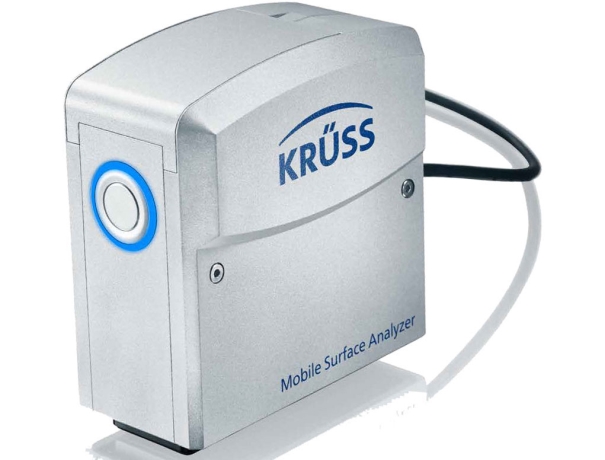Kruss is a German company that has been a prominent manufacturer of surface analysis equipment for several decades.
What are Surface Analyzers
Kruss Surface Analyzers are specialized tools and systems used to analyze the properties of surfaces and interfaces. These instruments play a crucial role in understanding the physical and chemical characteristics of various materials, especially at the nanoscale and microscale levels.
Applications
Kruss Surface Analyzers are versatile and can be employed in a wide range of applications across different fields, including chemistry, materials science, physics, and various industries. Here are some of the key aspects they can check and their applications:
Surface Tension: Kruss instruments are frequently used to measure the surface tension of liquids. This is essential in fields like pharmaceuticals, where the surface tension of solutions can impact drug formulation and delivery. It is also relevant in quality control for coatings, inks, and paints.
Contact Angle: It can determine the contact angle, which is the angle at which a liquid droplet meets a solid surface. This measurement helps in understanding wetting and adhesion properties of surfaces. Applications include studying the wetting behavior of coatings, adhesives, and self-cleaning surfaces.
Interfacial Tension: Kruss analyzers can also measure the interfacial tension between immiscible liquids, such as oil and water. This is vital in the petrochemical industry for understanding the behavior of oil-water mixtures and in the food industry for analyzing emulsions.
Roughness and Topography: Kruss instruments can assess surface roughness, texture, and topography, which is essential in fields like metallurgy, semiconductor manufacturing, and quality control of various products. The ability to analyze surface roughness is critical for ensuring the functionality and performance of mechanical and electronic components.
Surface Energy: Surface energy analysis is vital for understanding adhesion, friction, and lubrication properties of materials. Kruss Surface Analyzers are used to evaluate surface energy, helping in the development of adhesives, lubricants, and coatings in industries like automotive and aerospace.
Chemical Analysis: Some Kruss instruments are equipped with techniques like X-ray photoelectron spectroscopy (XPS) and Fourier-transform infrared spectroscopy (FTIR) for in-depth chemical analysis of surfaces. This is beneficial in research and development across various scientific and industrial domains.
Applications:
Biomaterials and Pharmaceuticals: In the field of biomaterials and pharmaceuticals, it help researchers assess the wettability and surface properties of biomaterials, drug formulations, and medical devices.
Electronics: For the electronics industry, these analyzers are essential for characterizing the surface properties of semiconductor materials and components, which can impact performance and reliability.
Quality Control: In manufacturing and production, Kruss Surface Analyzers play a vital role in quality control. They help ensure that materials and products meet specified surface properties and standards.
Environmental Applications: These instruments can also be used to study environmental factors, such as monitoring the surface properties of pollutants, oil spills, or other contaminants in water.
Kruss Surface Analyzers are highly versatile and continue to evolve with advances in technology. They offer valuable insights into the properties of surfaces and interfaces, enabling scientists, engineers, and industry professionals to develop better materials, products, and processes. These instruments have a wide range of applications and are instrumental in improving the performance and quality of various products in diverse industries.
The Kruss Mobile Surface Analyzer MSA One-Click SFE is a specialized instrument designed for the quick and easy measurement of surface free energy (SFE) of solid materials. Surface free energy is an important property that influences wetting behavior, adhesion, and the overall interaction of a material's surface with liquids or other materials. The MSA One-Click SFE is a portable and user-friendly device that offers several advantages in various applications.
Key Features and Advantages
Portability: The MSA One-Click SFE is a portable device, making it easy to transport and use in various locations. This feature is especially valuable for field applications and on-site measurements.
User-Friendly Interface: The instrument is designed with a user-friendly interface that simplifies the measurement process. It allows both experts and non-experts to perform surface energy measurements with ease.
One-Click Operation: As the name suggests, the MSA One-Click SFE can be operated with a single click, making it extremely convenient for users. This simplicity reduces the risk of operator error and minimizes the time required for measurements.
Rapid Results: The instrument provides fast results, allowing for quick assessments of surface free energy. This speed is particularly beneficial in industries where rapid quality control and decision-making are essential.
Contact Angle Measurement: The MSA One-Click SFE measures the contact angle, which is crucial for determining surface wettability. The contact angle data can be used to calculate surface free energy and understand how a material interacts with different liquids.
Automated Data Analysis: The instrument often comes with integrated software that automates data analysis and surface energy calculations, further simplifying the measurement process.
Applications in Quality Control: Used in quality control and assurance across various industries. It helps ensure that materials and products meet specific surface property requirements and standards.
Materials Development: Researchers and material scientists use the MSA One-Click SFE to optimize material properties and develop advanced materials. By understanding surface free energy, they can design materials with desired wetting characteristics.
Adhesion and Coating Development: Industries that rely on adhesives and coatings, such as automotive and aerospace, use this instrument to assess and enhance the adhesion properties of surfaces. It aids in formulating adhesives and coatings that adhere effectively to various substrates.
Biomedical and Pharmaceutical Applications: In the biomedical and pharmaceutical fields, the MSA One-Click SFE is employed to evaluate the wettability of biomaterials and the surface properties of drug formulations, medical devices, and implants.
Environmental Research: The instrument can also find applications in environmental research by studying the surface properties of materials and pollutants in environmental samples, including water and soil.
